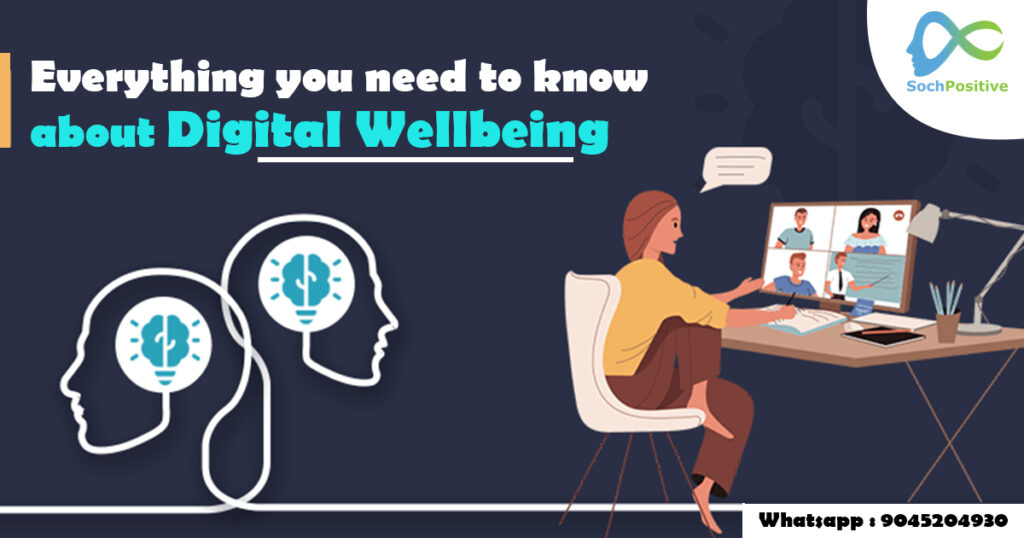Blog By : Krish Virmani
Keywords: Digital Well-being, Negative effects, Improving Well-being
Over the past few decades, our lives have become heavily integrated with mobile technologies such as laptops, tablets, and smartphones that have allowed us to have access to numerous benefits such as ubiquitous connectivity, access to infinite information, higher productivity, and much more. However, with the increasing dissemination of technology, there is a growing need to address the effect (or the lack of positive effect) technology has on our overall well-being, a concept that is commonly known as “Digital Well-being”.
The concept of digital well-being can be understood as the optimal balance between the drawbacks and benefits obtained from mobile connectivity. Therefore, it is not just about reducing the time spent on your devices but relates to optimizing the time spent using technology in a way that has positive effects on your well-being.
Understanding Well-being
While usage of the term ‘well-being’ is quite common in the usual discourse, the meaning attached is often vague and dynamic owing to its complicated nature. However, seeing as this article is regarding fostering well-being, we must address what truly encompasses it to reach a common understanding.
Most researchers agree that generally speaking, well-being consists of 3 essential elements, namely, a cognitive evaluation of overall satisfaction with one’s life, presence of positive feelings, and the often-neglected element, the lack of negative feelings. Further, it is a holistic phenomenon that is related to how the individual feels and functions across several areas, including cognitive, emotional, social, physical, and even spiritual.
There is a consensus between psychologists regarding the close relationship well-being has with several positive qualities that promote physical and mental health such as longevity, susceptibility or resistance to illness, and social connectedness.
Click Here to do a quick well-being test on yourself.
How can technology hamper our Well-being?
It wouldn’t be false if one were to say that our overall growth as a society is proportionally related to the integration of technology in our daily lives. However, even despite this overly positive relationship, there are many consequences of this integration that can severely hamper various aspects of our well-being if left unchecked.
Before I address the psychosocial consequences of connectivity, it is first very crucial to talk about the actual health risks associated with technology use. It is now common knowledge that mobile phones emit radiofrequency energy, and while it theoretically could function as a carcinogen, there is still no conclusive correlation between mobile phone usage and increased risk for developing a tumor. What we do know conclusively is that mobile technology usage is directly responsible for detrimental effects on our brain activity, posture, reaction times, and even our sleep patterns. However, you as a digitally self-aware individual don’t have too much to worry about, as these changes aren’t permanent and can be improved by the adoption of various intervention strategies that this article is later going to address.
If for some reason, you do find yourself using your mobile phone excessively, you should be aware of the psychosocial risks that it brings with it. Not only does increased usage worsen your ability to deal with stress, and has an indirect relationship with depression, anxiety, and insomnia but research suggests that it can even spiral into an actual addiction that is physically and behaviorally comparable to alcohol addiction. This means that the longer you take to address the problem, the harder it is going to be for you to do anything about it. While increased usage does lead to a decline in physical activity, it is also quite responsible for a decline in our social activity. This has made it so that individuals are starting to replace the notion of actual physical communication with virtual communication which only further affects our mental health as real human contact is essential for our well-being.
Improving your digital Diet
While I have discussed the negative effects of excessive usage, it is still unclear as to how much, is too much really. To be honest, there is no right answer for this question but it really depends on each individual and how their usage is affecting them.
One simple method to assess whether you’re spending too much time on the internet is to check if you’re suffering from the negative side-effects mentioned above. Ask yourself a few simple questions such as: Do I have trouble falling asleep or maintaining my sleep? Do I feel anxious without my phone? Am I spending way too much time online as compared to outside with real people? etc. If done honestly, this introspective exercise is surely going to help you gain insight into the state of your digital well-being. Another more practical method involves using free applications like ActionDash or Digital Wellbeing that help you keep track of your digital habits including not only the total time spent but individual statistics related to each application that you use.
Once an understanding of your digital usage has been developed, it is important to set some boundaries by modifying or restricting certain aspects of your usage. Create new social rules, such as no screen time during meals, no social media in the morning until you have done predetermined tasks, or even redirecting your usual usage to more productive tasks such as watching educational videos, or pursuing personal hobbies. It is important to set goals and time limits on how frequently you use your devices. Applications like Forest can help you forcefully limit your usage if necessary. Be sure to restrict all usage before going to bed so as to alleviate sleep disturbances thereby, improving your chances against psychological ailments.
Lastly, it is important now to find healthier alternatives to mobile phones to not only improve overall well-being but also to prevent any relapse. Create morning rituals that involve exercising, eating, or grooming yourself as there’s no reason to involve using your phone during these activities. Try to replace day-to-day usage by engaging in other creative or physical outlets; read a book, pick up a new instrument, or even go out more, just be sure to practice digital awareness and your mental health is sure to reap the benefit.






